COPING STRATEGIES AS A COMPONENT OF SELF-REGULATION OF STUDENTS' EDUCATIONAL ACTIVITIES
Keywords:
self-regulation, educational activity, self-regulated learning, students, pedagogy, coping strategies, stressAbstract
The article is devoted to the study of self-regulation of students' educational activities using two key methods – "Academic self-regulation" by R. Ryan and "Coping strategies" by R. Lazarus. The authors systematically consider various aspects of mental self-regulation and its influence on stress-coping strategies. In the article, the authors present the results of the analysis of the nature of the relationship between coping strategies and features of academic self-regulation in the context of higher education.
It was found that most of the studied students demonstrate average levels of self-regulation according to the following scales: external regulation, introjective regulation, identified regulation, and self-motivation. It has been established that the variety of identified coping strategies indicates an individualized approach to overcoming stress in the conditions of higher education, however, the predominant orientation is towards solving problems.
The results of a correlation analysis are presented, which allows us to determine the presence and nature of connections between specific types of self-regulation and selected strategies for overcoming stress. Direct and inverse correlations were established, which confirms the relationship between various aspects of self-regulation and the effectiveness of stress-coping strategies.
It was concluded that the obtained results will contribute to a deeper understanding of the psychological mechanisms of self-regulation in the academic environment and the further development of pedagogical and psychological practice in the system of higher education.


